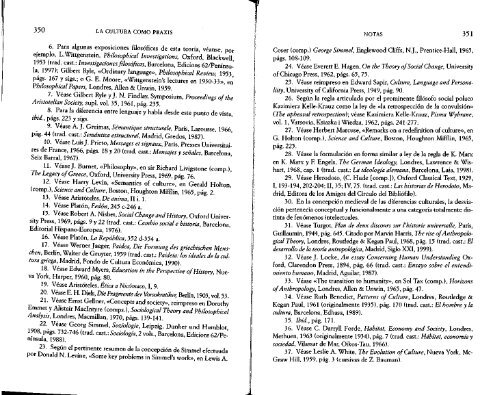Zygmunt Bauman La cultura como praxis
Zygmunt Bauman La cultura como praxis
Zygmunt Bauman La cultura como praxis
Create successful ePaper yourself
Turn your PDF publications into a flip-book with our unique Google optimized e-Paper software.
350 LA CULTURA COMO PRAXIS<br />
6. Para algunas exposiciones filosóficas de esta teoría, véanse, por<br />
ejemplo, L.Wittgenstein, Philosophical Investigations, Oxford, Blackwell,<br />
1953 (trad. cast.: Investigaciones filosóficas, Barcelona, Edicions 62/Península,<br />
1997); Gilbert Ryle, «Ordinary language», Philosophical Review, 1953,<br />
págs. 167 y sigs.; o G. E. Moore, «Wittgenstein's lectures en 1930-33», en<br />
~Philosophical Papen, Londres, Alien & Unwin, 1959.<br />
7. Véase Gilbert Ryle y J. N. Findlay, Symposium, Proceedings o/the<br />
Arístotelian Society, supl. vol. 35,1961, pág. 235.<br />
8. Para la diferencia entre lenguaje y habla desde este punto de vista,<br />
ibid., págs. 223 y sigs.<br />
9. Véase A. J. Greimas, Sémantique structurale, París, <strong>La</strong>rousse, 1966,<br />
pág. 44 (trad. cast.: Semántica estructural, Madrid, Credos, 1987).<br />
10. Véase Luis J. Prieto, Messages et signaux, París, Presses Universitaires<br />
de France, 1966, págs. 18 y 20 (trad. cast.: Mensajes y señales, Barcelona,<br />
Seix Barral, 1967).<br />
11. Véase J. Burnet, «Philosophy», en sir Richard Livigstone (comp.),<br />
The Legacy ofGreece, Oxford, Universíty Press, 1969, pág. 76.<br />
12. Véase Harry Levin, «Semantics of culture», en Gerald Holton,<br />
(comp.), Science and Culture, Boston, Houghton Mifflin, 1965, pág. 2.<br />
13. Véase Aristóteles, De anima, II i. 1.<br />
14. Véase Platón, Fedón, 245 c-246 a.<br />
15. Véase Robert A. Nisbet, Social Change andHistory, Oxford University<br />
Press, 1969, págs. 9 y 22 (trad. cast.: Cambio social e historia, Barcelona,<br />
Editorial Híspano-Europea, 1976).<br />
16. Véase Platón, <strong>La</strong> República, 352 d-354 a.<br />
17. Véase Werner Jaeger, Paidea, Die Formung des gríechischen Menschen,<br />
Berlín, Walter de Gruyter, 1959 (trad. cast.: Paideia: los ideales de la <strong>cultura</strong><br />
griega, Madrid, Fondo de Cultura Económica, 1990).<br />
18. Véase Edward Myers, Education in the Perspective ofHistory, Nueva<br />
York, Harper, 1960, pág. 80.<br />
19. Véase Aristóteles, Ética a Nicómaco, I, 9.<br />
20. Véase E. H. EMels, Die Fragmente der Vorsokratiker, Berlín, 1903, vol. 53.<br />
21. Véase Ernst Gellner, «Concepts and society», reimpreso en Dorothy<br />
Emmet y Alistair Maclntyre (comps.), Sociological Theory and Philosophical<br />
Analysis, Londres, Macmillan, 1970, págs. 139-141.<br />
22. Véase Georg Simmel, Soziologie, Leipzig, Dunker und Humblot,<br />
1908, págs. 732-746 (trad. cast.: Sociología, 2 vols., Barcelona, Edicions 62/Península,<br />
1988).<br />
23. Según el pertinente resumen de la concepción de Simmel efectuada<br />
por Donald N. Levine, «Some key problems in Simmers work», en Lewis A.<br />
NOTAS 351<br />
Coser (comp.) George Simmel, Englewood Cliffs, N.J., Prentice-Hall, 1965,<br />
págs. 108-109.<br />
24. Véase Everett E. Hagen, On the Theory of Social Change, University<br />
of Chicago Press, 1962, págs. 65, 75.<br />
25. Véase reimpreso en Edward Sapir, Culture, <strong>La</strong>nguage and Personaliity,<br />
University of California Press, 1949, pág. 90.<br />
26. Según la regla articulada por el prominente filósofo social polaco<br />
Kazimierz Kelle-Krauz <strong>como</strong> la ley de «la retrospección de la convulsión»<br />
(The upheaval retrospection); véase Kazimierz Kelle-Krauz, Pisma Wybrane,<br />
vol. 1, Varsovia, Ksiazka i Wiedza, 1962, págs. 241-277.<br />
27. Véase Herbert Marcuse, «Remarks on a redefinition of culture», en<br />
G. Holton (comp.), Science and Culture, Boston, Houghton Mifflin, 1965,<br />
pág. 225.<br />
28. Véase la formulación en forma similar a ley de la regla de K. Marx<br />
en K. Marx y F. Engels, The Germán Ideology, Londres, <strong>La</strong>wrence & Wishart,<br />
1968, cap. 1 (trad. cast.: <strong>La</strong> ideología alemana, Barcelona, <strong>La</strong>ia, 1998).<br />
29. Véase Herodoto, (C. Hude [comp.]), Oxford Classical Text, 1929,<br />
1,193-194,202-204; II, 35; IV, 75. (trad. cast.: <strong>La</strong>s historias de Herodoto, Madrid,<br />
Editora de los Amigos del Círculo del Bibliófüo).<br />
30. En la concepción medieval de las diferencias <strong>cultura</strong>les, la desviación<br />
pertenecía conceptual y funcionalmente a una categoría totalmente distinta<br />
de fenómenos intelectuales.<br />
31. Véase Turgot, Plan de deux discours sur l'historie universelle, París,<br />
Guillaumin, 1944, pág. 645. Citado por Marvin Harris, The rise of Anthropological<br />
Theory, Londres, Routledge & Kegan Paul, 1968, pág. 15 (trad. cast.: El<br />
desarrollo de la teoría antropológica, Madrid, Siglo XXI, 1999).<br />
32. Véase J. Locke, An essay Concerning Human Understanding Oxford,<br />
Clarendon Press, 1894, pág. 66 (trad. cast.: Ensayo sobre el entendimiento<br />
humano, Madrid, Aguilar, 1987).<br />
33. Véase «The transition to humanity», en Sol Tax (comp.), Horizons<br />
of Anthropology, Londres, Alien & Unwin, 1965, pág. 47.<br />
34. Véase Ruth Benedict, Patterns of Culture, Londres, Routledge &<br />
Kegan Paul, 1961 (originalmente 1935), pág. 170 (trad. cast.: El hombre y la<br />
<strong>cultura</strong>, Barcelona, Edhasa, 1989).<br />
35. Itó/.,pág. 171.<br />
36. Véase C. Darryll Forde, Habitat, Economy and Society, Londres,<br />
Methuen, 1963 (originalmente 1934), pág. 7 (trad. cast.: Habitat, economíay<br />
sociedad, Vilassar de Mar, Oikos-Tau, 1966).<br />
37. Véase Leslie A. White, The Evolution of Culture, Nueva York, Mc-<br />
Graw Hill, 1959, pág. 3 (cursivas de Z. <strong>Bauman</strong>).


